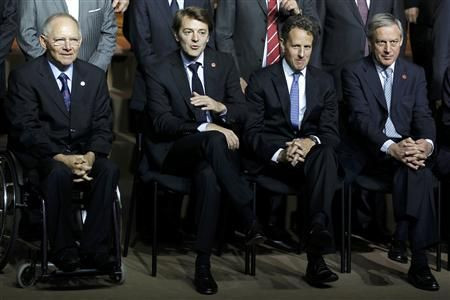G-20 Ministers Will Back Capital Surcharges on Biggest Banks

Finance ministers and central bankers from the world's top economies are set to back mandatory capital surcharges on big lenders of as much as 2.5 percent to be phased in beginning in 2016.
A draft communique from a meeting of G-20 finance chiefs endorses a 1-2.5 percent capital surcharge on large banks like Goldman Sachs, HSBC, Deutsche Bank, and JPMorgan Chase.
The aim is to make sure they have enough capital to withstand market turbulence so that taxpayers won't have to rescue banks again in the next crisis.
A summit of the G-20 leaders in Cannes, France, early next month is set to give final approval to the surcharge plan and name the banks affected, known as global systemically important financial institutions or G-SIFIs, G-20 sources said.
Now that the framework applicable to G-SIFIs is agreed, we urge the Financial Stability Board to define the modalities to extend expeditiously the framework to all SIFIs, said the draft communique obtained by Reuters.
Insurers are battling against a surcharge as second-tier banks.
The charge -- to be assessed distinct from the 7 percent minimum core capital buffer being phased in for all banks starting in 2013 -- is part of a wider package the G-20 ministers are set to endorse on Saturday.
The other elements include common tools for supervisors to wind up ailing banks, such as a compulsory living will or resolution plan for every big bank, and more intensive supervision for large lenders, the communique said.
The FSB formulates and coordinates financial regulation on behalf of the G-20, and it has already drawn up criteria to determine which banks face a surcharge.
It has said 28 banks would be affected if the regime was introduced immediately, but G-20 sources said the Cannes summit may name up to 50 lenders.
Position Limits
The FSB is also expected to bring ministers up-to-date on its work to define the so-called shadow banking sector before thrashing out recommendations next year to regulate it.
Supervisors fear that as banks face tougher rules, risky activities could migrate to other parts of the financial system, such as money-market funds and special vehicles.
G-20 presidency France appears to have lost its battle to introduce tough curbs on what it sees as speculation in food and energy commodity markets by imposing limits on the size of positions a trader can hold at any given time.
G-20 sources said the group was expected to approve a report from the International Organization of Securities Commissions, which groups national market watchdogs, on the benefit of imposing trading limits, but it would remain optional.
The U.S. Commodity Futures Trading Commission is set to discuss fixed limits on Tuesday, but in Europe there is no consensus, with Britain opposed to such permanent curbs.
Stronger FSB
Bank of Italy Governor and FSB Chairman Mario Draghi is expected to propose strengthening the FSB to ensure proper implementation of a welter of new rules the G-20 has pledged to introduce, including the bank capital surcharge.
Draghi, who steps down as chairman of the FSB this month to become president of the European Central Bank, is expected to propose more members from emerging markets and developing countries on the FSB's agenda-setting steering committee.
Some Asian and Latin American countries feel the regulatory measures now being finalized plug supervisory holes in European and U.S. markets and want their circumstances to shape future G-20 regulatory work.
Draghi also wants representatives of finance ministries on the steering committee to add political clout.
Draghi will also discuss the possibility to give FSB a legal personality and to allow it to receive resources from more diversified sources, a G-20 source said.
Saturday's meeting will also touch on who will replace Draghi. Bank of Canada Governor Mark Carney is seen by some G-20 officials as the main contender so far that the Cannes summit will endorse.
G-20 ministers are also expected to look at proposals to reinforce nonbinding draft principles on financial consumer protection authored by the Organization for Economic Cooperation and Development that have been criticized for being too weak.
(Additional reporting by Daniel Flynn in Paris, editing by Mike Peacock)
Reuters
© Copyright Thomson Reuters {{Year}}. All rights reserved.





















